Granulated Garlic: Benefits for Equine Health


Intro
When it comes to the world of equine nutrition, granulated garlic often finds itself amidst a myriad of ingredients. Horse owners, trainers, and enthusiasts alike are keen to understand the nuances of this often-overlooked additive. The essence of granulated garlic extends beyond mere flavor enhancement; it holds potential nutritional benefits that may play a significant role in optimal horse health.
Garlic, particularly in its granulated form, is packed with antioxidants and other phytochemicals. Its historical presence in many cultures suggests it carries a wealth of wisdom regarding health benefits, but when applied to horses, how does it fare? Examining the various properties of granulated garlic can reveal its therapeutic potential, while also shedding light on any precautions one should consider.
This exploration delves into the defining aspects of granulated garlic, including what it is, its benefits, and how it can be incorporated into a horse's diet. The goal is to provide a thorough understanding that can aid horse owners in making informed decisions for their equine companions, ensuring that the health and wellbeing of these animals come first.
Key Concepts and Terminology
Definition of Terms
Understanding the terminology is crucial when addressing granulated garlic in the context of equine care. Here are some essential terms:
- Granulated Garlic: This is garlic that has been dried and ground into small granules, making it a convenient and shelf-stable option for feeding horses.
- Antioxidants: Compounds that help protect the body from oxidative stress, which can impact overall health.
- Phytochemicals: Bioactive compounds found in plants, believed to have numerous health benefits.
Overview of Relevant Practices
Utilizing granulated garlic in horse diets isn't a mere whim. It involves understanding its place in a broader nutritional framework. Key practices to keep in mind include:
- Gradual Introduction: When adding granulated garlic, it's wise to introduce it slowly to avoid digestive upset.
- Dosing: The amount used should align with the horse's size and health status, taking care not to exceed recommended levels.
- Monitoring Health: Regular check-ins with a veterinarian are crucial to assess any changes in behavior or health when altering a horse's diet.
Current Trends and Innovations
Latest Research and Developments
The field of equine nutrition is constantly evolving, and recent studies have looked closely at how garlic impacts horses. Research indicates that garlic may support immune function and act as a natural insect repellent. However, more studies are necessary to fully validate these claims. As information unfolds, horse owners can stay updated on best practices.
Emerging Technologies and Tools
Advancements in technology are enabling more precise ways to assess equine diets. Nutritional apps and analytical tools can help owners track their horses' intake of garlic and other supplements, facilitating a more informed approach to nutrition.
Practical Applications
Incorporating granulated garlic into a horse's diet can seem daunting, but it can be a straightforward process with the right approach.
Step-by-Step Guides
- Assess Nutritional Needs: Consult with a veterinarian or an equine nutritionist to determine if granulated garlic should be included in your horse's diet.
- Choose Quality Garlic: Make sure to select high-quality granulated garlic without additives or preservatives.
- Start Small: Begin with a small amount in your horse's feed to observe any changes in digestion or behavior.
- Adjust Accordingly: Monitor your horse for adjustments in health or energy levels, and modify the dosage as needed.
Troubleshooting Common Issues
It's not uncommon to encounter challenges when adding new ingredients:
- Digestive Upset: If your horse exhibits signs of colic or loose stools, reduce the garlic amount and consult a vet if necessary.
- Refusal to Eat: If your horse refuses to eat its food with garlic, consider blending it with other appealing ingredients to mask the taste.
"In the world of horses, every small detail matters, and nutrition is the bedrock of health. Granulated garlic can play a whispering role in the chorus of well-being."
As horse owners explore the practicality and benefits of granulated garlic for their companions, staying informed and cautious remains essential. The journey promises not just nutritional enhancement but a partnership grounded in care and understanding.
Preamble to Granulated Garlic
Granulated garlic has made its mark as an ingredient in equine nutrition, praised by horse owners and experts alike for its numerous benefits. Understanding this topic is crucial not just for enhancing a horse's diet but also for addressing broader health concerns. The use of garlic, especially in granulated form, taps into both traditional wisdom and scientific inquiry, offering a multi-faceted approach to horse care.
Definition and Composition of Granulated Garlic
Granulated garlic is essentially dried garlic that has been chopped into granules. Unlike garlic powder, granulated garlic retains a slightly coarser texture which some suggest is better for incorporating into feed. It does not only serve a culinary purpose but is cherished in the equestrian community for its potential health benefits.
The composition of granulated garlic centers around its active compounds, most notably alliin and allicin. When garlic is crushed or chopped, the alliin transforms into allicin, which is responsible for many of garlic’s health-boosting properties. Additionally, granulated garlic contains vitamins B6, C, and essential minerals like manganese and selenium, contributing to its nutritional density.
Here’s a breakdown of its key components:
- Active compounds: Alliin, Allicin
- Vitamins: B6, C
- Minerals: Manganese, Selenium
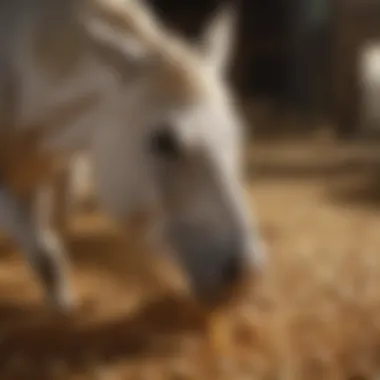
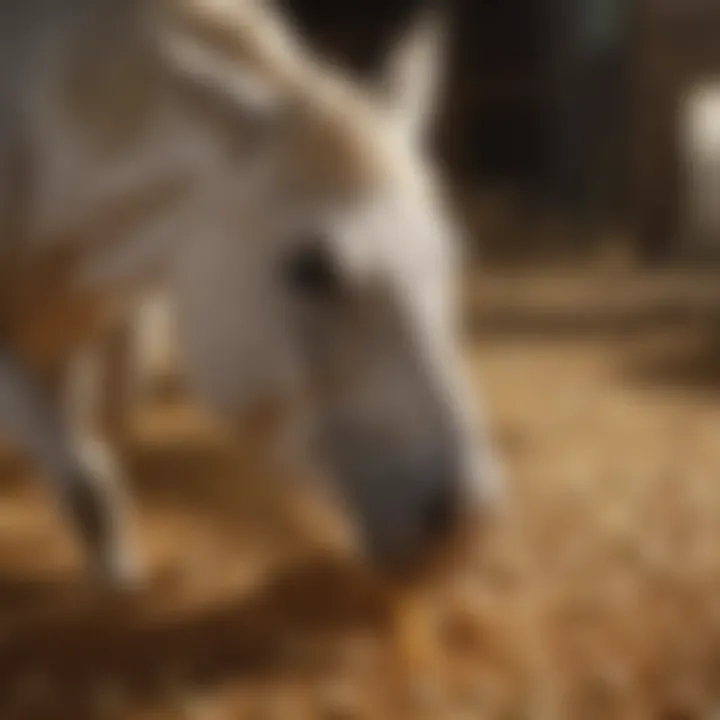
Thus, granulated garlic's rich biochemical profile not only acts as a flavorful supplement for horses but also holds a promise for ongoing health improvements, making it a valuable addition to equine diets.
Historical Use of Garlic in Equines
Historically, garlic has been integrated into the diets of various domesticated animals, including horses. This tradition can be traced back thousands of years when it was recognized for its medicinal properties. Ancient civilizations, from the Greeks to the Chinese, recognized its broad spectrum of health benefits.
Horse owners have long used garlic to combat various ailments, believing it could help ward off respiratory issues and boost overall vitality. Many equestrians claim that garlic has insect-repelling properties, which aligns with its use in traditional veterinary practices. This sentiment is still echoed today among those who see garlic as a natural remedy loaded with potential benefits.
In modern practice, while there’s still a firm reliance on garlic, the emphasis has shifted towards evidence-based benefits that modern science has begun to affirm. The increasing interest in natural supplements has led to a resurgence in using garlic for horses. In doing so, horse owners strive to combine the wisdom of the past with the discoveries of today.
"Garlic isn't just a flavor enhancer; it's a legacy of care for our horses that spans generations."
Overall, the historical usage of garlic in equines lays a foundational context, illustrating a long-standing relationship with nature’s bounty that continues to evolve with the times. As the understanding of granulated garlic's potential solidifies, it becomes increasingly vital for horse owners to be informed about how to incorporate this ancient ingredient into their horses' diets.
Nutritional Benefits of Granulated Garlic
Granulated garlic isn’t just a culinary ingredient; it has potential health benefits that can be very useful for maintaining equine vitality. It’s packed with nutrients and can play a significant role in a horse's diet. The importance of understanding the nutritional benefits lies in its ability to bolster health, prevent ailments, and improve the overall quality of life for horses. When looking at granulated garlic, several key elements merit attention, including its vitamin and mineral content, its antioxidant properties, and its role in supporting a robust immune system.
Vitamins and Minerals Content
Granulated garlic is rich in various vitamins and minerals that contribute to the overall health of horses. For instance, it contains vitamins C and B6 alongside crucial minerals like manganese and selenium. These nutrients can promote strong bones and support metabolic processes.
- Vitamin C is known for its antioxidant properties, aiding in collagen synthesis, essential for maintaining skin and connective tissue health.
- Vitamin B6 plays a role in protein metabolism and the production of neurotransmitters, adding to the cognitive well-being of the horse.
- Manganese, although required in trace amounts, is vital for bone health and connective tissue formation.
- Selenium is a necessary antioxidant that helps thwart cell damage and supports immune function.
This combination of micronutrients can be particularly beneficial, helping horses recover from exercise while maintaining cross-training and performance.
Antioxidant Properties
Antioxidants present in granulated garlic play an essential role in combating oxidative stress in horses. Oxidative stress occurs when there's an imbalance between free radicals and antioxidants in the body, which could lead to inflammation and other health issues. Compounds like allicin, which is formed when garlic is crushed or chopped, have been studied for their strong antioxidant effects.
This can assist horses in:
- Reducing recovery times after intense physical activity.
- Minimizing inflammation in muscles and joints.
- Enhancing overall stamina and performance by protecting muscle tissue from damage.
These properties can be particularly crucial for working horses or those in competitive situations, helping maintain their health and performance levels.
Role in Immune Support
The immune system in horses functions as the body's defense mechanism against infections and diseases. Granulated garlic has components known to enhance immune function. It promotes the activity of certain immune cells, helping to fend off illness.
- Garlic compounds can stimulate the production of white blood cells and macrophages, which act as the first line of defense against pathogens.
- Additionally, the regular inclusion of granulated garlic may contribute to overall gut health, which is essential since a large portion of the immune system is located in the gastrointestinal tract.
Given that strong immunity is foundational for a horse's health, integrating granulated garlic into their diet may improve resilience against infections and systemic illnesses.
Garlic is not just food; it’s a fortress supporting our equine friends in their daily battles against illness.
In summary, understanding the nutritional benefits of granulated garlic reveals a multi-faceted approach to equine care. It’s not merely about flavoring feed; it’s about harnessing the power of a superfood that can enhance health, fortify defenses, and contribute to overall well-being.
Health Impacts of Granulated Garlic
When considering the integration of granulated garlic into equine diets, understanding its health impacts is paramount. This section unpacks the potential benefits associated with garlic, which can contribute to the overall well-being of horses. This isn’t just a fleeting trend in equine nutrition; the influences of garlic can be profound and multifaceted, supporting various aspects of a horse’s health.
Digestive Health
Heavy movements and intense exercise can sometimes take a toll on a horse's digestive system. Granulated garlic has been noted to support digestive health in a few ways. First, it can help promote a balanced gut environment. The natural compounds found in garlic possess prebiotic qualities, meaning they may facilitate the growth of beneficial gut bacteria. This is particularly important in preventing conditions such as colic, which can arise from imbalanced gut flora.
Additionally, garlic aids in enhancing appetite, which is crucial for horses that may be recovering from illnesses or facing stress. A horse that eats well digests food more efficiently, leading to better nutrient absorption. When it comes down to it, a thriving digestive system is key to a horse's overall health and performance.
Respiratory Benefits
Another area where granulated garlic shines is respiratory health. Garlic contains compounds known as allicin, which have been associated with anti-inflammatory properties. Horses, like any other animal, can be susceptible to respiratory issues resulting from environmental allergens or infections. This is where garlic can play a role—in helping support a healthier respiratory tract.
Garlic is believed to help clear mucus and open airways, making breathing easier for horses that may have seasonal allergies or minor respiratory problems. Horse owners often pay special attention to their equines’ breathing capacity since a healthy respiratory system can impact athletic performance and overall vitality.
"Natural remedies like garlic can complement standard veterinary care when tackling respiratory discomfort. It’s not a replacement for professional advice, but an ally in overall wellness."
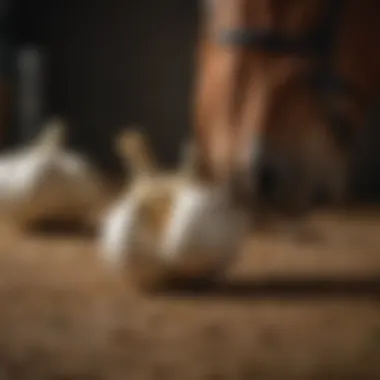

Potential Pest Repellent Properties
Garlic is well-known for its pest-repelling properties, a benefit that extends into equine care. The strong odor of garlic can act as a deterrent for certain insects, potentially keeping bothers like flies, mosquitoes, and ticks at bay. This can be especially important during warmer months when these pests are most active.
Including granulated garlic in a horse’s diet might not only keep these annoying intruders away but also reduce the stress levels in horses, who tend to become agitated when swatted or bitten by pests. Therefore, a dose of garlic could mean not just a more comfortable horse, but a clearer mind for both horse and rider.
In summary, the health impacts of granulated garlic on horses can indeed be substantial. From improving digestive health and respiratory function to serving as a natural pest repellent, integrating this ingredient could offer numerous benefits, enriching the lives of both horses and their owners.
Incorporating Granulated Garlic into Equine Diets
Granulated garlic presents an intriguing option for horse owners seeking to enhance their equine diets. It's not just about throwing in some garlic for flavor; it’s about tapping into its myriad benefits that can significantly contribute to a horse’s overall health. When integrated thoughtfully, granulated garlic can fit snugly into a balanced equine diet while maximizing the nutritional benefits it offers.
Recommended Dosage and Administration
When it comes to adding granulated garlic to a horse's diet, dosing is key. Typically, a common recommendation is to start with small amounts, around one teaspoon per day for a standard-sized horse, gradually increasing the dose based on response and health needs. For high-performance horses, some owners may opt to increase the dosage to about two teaspoons daily. However, be sure to introduce garlic slowly to avoid digestive upset.
Administration Tips:
- Mixing it in Feeds: Combine granulated garlic with grains or sweet feeds to mask its strong taste, making it more palatable. Horses are often creatures of habit, so adding it to familiar feed can help ease them into this new addition.
- Water Incorporation: For some horses, soaking hay or fresh feeds in garlic-infused water can also deliver this nutrient without the direct taste.
- Consistency: Regular use is vital to see long-term benefits, so incorporate it into their daily feeding regimen. Keep an eye on your horse's reactions to ensure they tolerate it well.
Sourcing Quality Granulated Garlic
Choosing the right product can make all the difference in harnessing the benefits of garlic. Quality matters, after all. When sourcing granulated garlic, consider a few pointers:
- Choose Trusted Brands: Look for reputable brands that specifically cater to equine health products. Names like Horsemen's Pride or Farnam are known for their formulations that prioritize horse health.
- Ingredient Transparency: Always check the ingredient label. Ideally, it should contain pure granulated garlic without unnecessary fillers or additives.
- Organic Options: If your budget allows, consider organic granulated garlic. These varieties often come without chemical residues and are generally favored for their purity and health benefits.
Taking the time to source quality ingredients will pay off in the health and vitality of your horses.
Complementary Ingredients for Balanced Nutrition
Granulated garlic is not a standalone treatment; it works best in concert with other nutrients and supplements to create a balanced diet. Here are some complementary ingredients to consider:
- Lecithin: Helps improve digestion and can work harmoniously with garlic.
- Flaxseed: Rich in omega-3 fatty acids, it can promote healthy coat and skin while aiding in digestion.
- Probiotics: These can enhance gut health, ensuring that your horse’s digestive system is well-primed to absorb the beneficial properties of garlic.
- Vitamins E and C: Antioxidants that support overall immune health, working alongside garlic to keep your horse resilient against illness.
By considering these complementary ingredients, horse owners can create a well-rounded nutritional plan that leverages the advantages of granulated garlic while promoting overall health.
Considerations Before Using Granulated Garlic
Using granulated garlic in a horse's diet can be a beneficial practice, yet it’s not without its cautionary aspects. This section emphasizes the key factors every horse owner should contemplate before incorporating garlic into their equine care routine. Understandings regarding allergic reactions, veterinary advice, and possible interactions with other products can go a long way in safeguarding your horse's health.
Allergic Reactions and Sensitivities
Though garlic is widely praised for its beneficial properties, it’s essential to recognize that every horse is distinct. Some horses may demonstrate sensitivity or even allergic reactions to garlic. These reactions can range from mild gastrointestinal distress to more severe issues, including skin irritations or respiratory problems.
Before introducing granulated garlic, watching for any case of adverse effects is prudent. Start with a small quantity to assess tolerance. It might also be wise to consult with seasoned horse owners who have experience in dealing with garlic. Keep in mind, not all horses will react negatively, but being cautious prevents unnecessary distress.
Consultation with a Veterinarian
Never underestimate the value of a well-informed veterinarian when making dietary changes for your horse. Consulting with a veterinarian is crucial prior to introducing granulated garlic into your horse's diet. Vets can provide insights based on an equine's health history, breed, and specific needs. They can help you weigh the benefits against any possible risks involved, including existing medical conditions or concurrent medications that might complicate things.
It's worthwhile to schedule a chat, even if it’s just a quick call. You might discuss:
- Current supplements or medications your horse is taking
- Specific health concerns your horse may have
- Suggested dosage of granulated garlic if deemed appropriate
The time spent seeking professional advice can potentially spare your horse from health issues down the line.
Interactions with Other Supplements and Medications
Garlic can interact with other substances your horse might already be consuming. For instance, garlic may amplify the effects of anticoagulants, potentially leading to hemorrhage risks in horses already on such medication. Likewise, if your horse is on drugs for gut health or specific constraining diseases, combining garlic could muddle the desired effects of these treatments.
It’s important to be aware of any existing supplements or medications. Careful documentation helps, perhaps keeping a log of what your horse currently ingests. If garlic aligns with your horse’s health plan, be sure to monitor for any unusual behaviors or symptoms that might suggest interactions.
Takeaway: Always weigh the benefits and risks before introducing granulated garlic in your horse’s diet. A well-rounded understanding of potential allergic reactions, veterinary advice, and interactions helps ensure your horse remains healthy and happy.
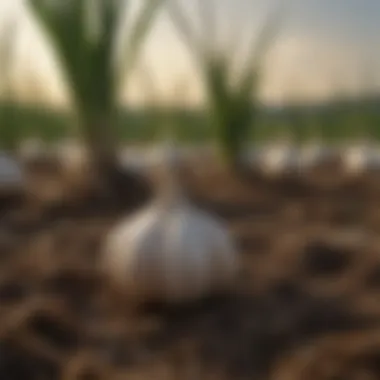
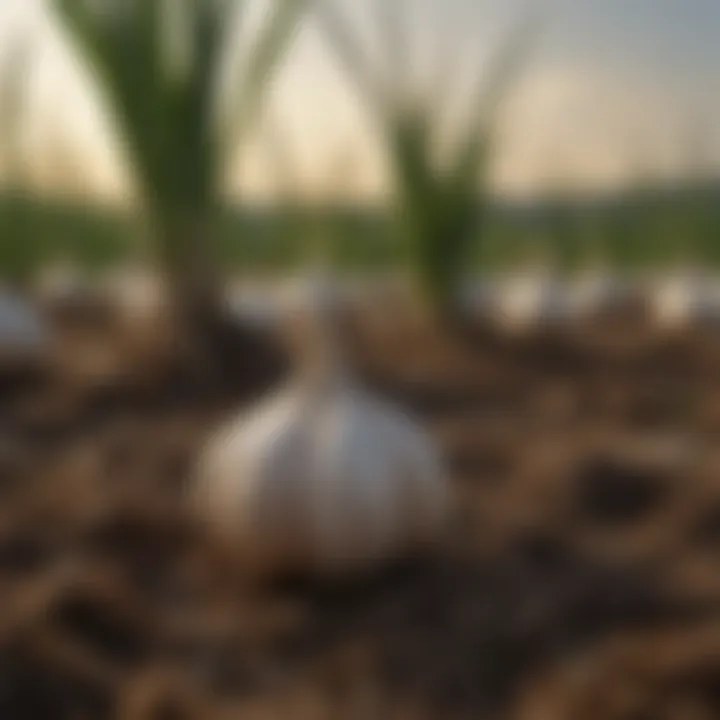
Garlic Myths and Misconceptions
The discussion around granulated garlic for horses is often clouded by common misunderstandings and myths. These misconceptions can lead to misinformation, affecting how horse owners perceive and utilize garlic in their equine care practices. Therefore, addressing these myths is critical not just for clarity but also for ensuring that horses receive the benefits without unnecessary risks.
Common Misunderstandings About Garlic in Equine Health
One prevalent myth is that garlic is a panacea for all equine health issues. While garlic has numerous benefits, such as its potential antioxidant properties and immune support, it isn’t a one-size-fits-all solution. This misconception can lead horse owners to rely solely on garlic for health issues, neglecting other critical aspects of equine nutrition and healthcare.
Another misunderstanding is related to the idea that garlic is harmful to horses. Some believe any form of garlic is dangerous due to its historical association with toxicity in certain species, like dogs. In reality, while excessive garlic consumption can create issues, moderate usage of granulated garlic at recommended dosages is generally considered safe for horses.
Moreover, many horse owners think that any granulated garlic will suffice, not realizing that sourcing a quality product is vital. Lower-quality garlic products may lack the desired nutrients or even contain additives that can be harmful instead of beneficial. Thus, understanding the proper formulation and sourcing of garlic is crucial for maximizing its benefits.
Scientific Research and Evidence
Scientific studies have begun to shed light on the various health benefits associated with garlic for horses. Research indicates that garlic may have a supportive role in promoting respiratory health and can act as a natural insect repellent. However, while promising, much of the evidence is still limited.
A significant study found that garlic can help improve immune function in horses when incorporated into their diet properly. This exploration needs further validation, but it highlights garlic’s potential role in a preventative care approach.
Moreover, while initial findings are encouraging, horse owners should consider the existing gaps in research. More rigorous, long-term studies are necessary to establish consistent guidelines on usage. A cautious approach, coupled with discussions with veterinarians, will help strike a balance between leveraging garlic's benefits and safeguarding horse health.
Remember: While garlic may offer benefits, it's essential to weigh these against any potential risks, ensuring a well-rounded discussion with equine health professionals.
By debunking these myths and looking closely at the evidence, horse owners can make more informed decisions on incorporating granulated garlic into their equine diets. This will ultimately lead to better health management practices that are both safe and effective.
Case Studies and Anecdotal Evidence
Understanding the effects of granulated garlic on horses goes beyond nutritional profiles and health benefits found in research articles. Case studies and anecdotal evidence serve as crucial components in this conversation, bringing to light real-world experiences and practical outcomes. Horse owners, trainers, and caretakers often share their observations, enriching the body of knowledge with insights that scientific data alone may not fully capture. This section aims to highlight the significance of these narratives and offer a deeper look into the long-term experiences associated with granulated garlic usage in equine diets.
Long-term Observations
Long-term observations involve tracking the health and performance of horses supplemented with granulated garlic over extended periods. Horse owners report various positive outcomes, ranging from improved digestion to enhanced energy levels. For instance, a small dressage stable in Kentucky introduced granulated garlic into their feeding regimen, noting that their horses exhibited greater stamina during training sessions. After several months, these horses also seemed to have fewer colds during the winter months, which was significant for their overall performance and competition readiness. While these observations don’t provide empirical data, they suggest a beneficial relationship between granulated garlic and equine health.
Another example comes from an owner of a retired show jumper. This individual decided to add garlic to her horse's diet to manage weight and provide additional nutritional support. Over a year, the horse not only maintained a healthy weight but also had a shiner coat. The owner strongly believes that integrating garlic bolstered her horse’s overall vitality, despite the absence of formal studies documenting such outcomes. That said, these kinds of narratives encourage further exploration and may offer grounds for directed studies in animal nutrition.
Testimonials from Horse Owners
Testimonials from horse owners often echo similar sentiments regarding granulated garlic. These real-life stories provide relatable insights that can bridge the gap between theory and practice. For instance, a horse trainer from Texas shared her experience of using granulated garlic as part of a holistic care plan for her competition horses. According to her, the addition of garlic resulted in fewer issues with flies, leading to happier and less stressed horses during training sessions.
Moreover, one particular case involved a mare that was notorious for her poor immune response. After implementing granulated garlic into her diet, the owner noticed a marked decrease in illness. The mare became more robust, and her recovery after competitions improved dramatically. Such testimonials illuminate the potential benefits while also serving to promote discussion among horse enthusiasts.
"Incorporating granulated garlic has made a notable difference in my horse's health. It’s not a magic bullet, but it’s been a game-changer for her immune system and overall vitality."
—— A satisfied horse owner
As with any supplement, the narratives reveal varying experiences—what works wonders for one horse might yield different results for another. Thus, while testimonials provide useful information, they should be viewed in the context of individual horse needs and conditions.
Both case studies and testimonials underline the necessity for a careful and individualized approach to horse nutrition. This segment finds a balance between established research and the lived experiences of horse owners, stressing the importance of practical, real-world applications of granulated garlic in horse care.
Epilogue and Recommendations
As we wrap up this exploration of granulated garlic for horses, it becomes clear that this common kitchen staple has much more to offer than meets the eye. The incorporation of granulated garlic into equine diets may elevate not just nutritional profiles but also provide various health advantages. Understanding how to leverage garlic's properties can empower horse owners, allowing them to make informed decisions regarding their animals' overall wellness.
Summarizing Benefits and Cautions
Granulated garlic is rich in vitamins, minerals, and antioxidants. When discussing the benefits, several key points emerge:
- Immunity Boosting: The antioxidants in garlic play a role in strengthening the immune system, which is vital for maintaining horse health.
- Digestive Aid: Many horse owners have reported improvements in digestive health after adding garlic to their horses' diets, promoting better nutrient absorption.
- Pest Control: Garlic’s reputation as a natural pest repellent can't be overlooked. It's believed to deter insects, which can be a boon during summer months.
However, it is paramount to exercise caution.
- Potential Allergies: Some horses might display sensitivities to garlic. It’s crucial to monitor reactions when introducing new foods.
- Interactions with Medications: Always consult with a veterinarian if your horse is on certain medications, as garlic can potentially interfere with treatments.
In summary, the benefits can be significant, but they must be balanced with careful consideration of individual circumstances.
Future Directions in Research and Practice
Looking ahead, the realm of equine nutrition is ripe for further study, particularly when it comes to granulated garlic. Some potential areas of exploration include:
- Dosage Optimization: Research could further define the ideal amounts of garlic for different equine activities, ages, and health statuses. This would aid in tailoring garlic supplementation to maximize benefits while minimizing risks.
- Long-term Effects: While testimonials and observational data suggest benefits, controlled studies would provide more concrete evidence regarding the long-term effects of garlic on equine health.
- Synergy with Other Supplements: It would be interesting to evaluate how garlic interacts with other common equine supplements, potentially discovering new combinations that enhance overall health outcomes.
Overall, granulated garlic has carved out its niche in equine care, but ongoing research will illuminate its full potential and help guide best practices. Horse owners should stay updated on findings and consider engaging in discussions within the farming community, including platforms like Reddit or Facebook groups dedicated to equine health.
"Granulated garlic stands at the crossroads of tradition and modern equine health science, promising a wealth of benefits but calling for careful management and ongoing study."







